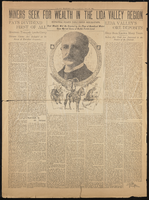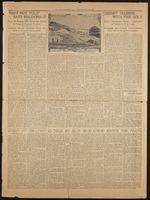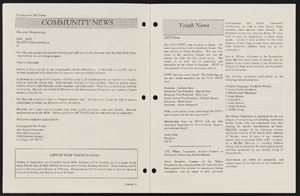Search the Special Collections and Archives Portal
Search Results

Meeting minutes for Consolidated Student Senate University of Nevada, Las Vegas, April 10, 1984
Date
Archival Collection
Description
Text

Transcript of interview with Jim Bilbray by Jeff van Ee, March 26, 2009
Date
Archival Collection
Description
Jim Bilbray served Nevada as member of the Board of Regents of the University of Nevada, chief legal counsel in the Clark County Juvenile Court, Nevada State Senator, member of the United States House of Representatives, the United States Senate, and is currently on the Board of Governors of the US Postal Service through 2015. Jim was born in Las Vegas on May 19, 1938. Among his most memorable accomplishments is his work for the environment. As a young boy growing up in Las Vegas, he loved the climate. His backyard at the family home on 3rd Street was at the edge of the city so his playground was the desert. These early years led to a lifelong appreciation for the Nevada outdoors. The 1980s and 1990s were historical for Nevada and environmental efforts. The Nevada environmental triumvirate and congressional delegation composed of Jim, Harry Reid and Richard Bryan are widely known for passing significant legislation in this field. They worked closely together, in part, because of their friendship formed while growing up together in Las Vegas. This interview helps put into perspective the pivotal role played by Congressman Bilbray. During his terms as Nevada Senator (1981 - 1987) and US Representative (1987-1995), Jim worked on a number of major public lands issues for Nevada. He helped to defuse the Sagebrush Rebellion, designate additional Forest Service wilderness, protect Red Rock as a National Conservation Area, assign the Spring Mountains as a National Recreation Area, and initiate the legislative effort to establish the Southern Nevada Public Lands Act. Jim currently resides in Las Vegas where an elementary school is named in his honor.
Text

Transcript of interview with Jacob Snow by Stefani Evans and Claytee White, August 29, 2016
Date
Archival Collection
Description
In recalling his career in the public sector, Boulder City native Jacob Snow credits fellow Nevadans Robert Broadbent and Bruce Woodbury as two mentors who helped shape his world view. After attending Boulder City schools and serving a religious mission in Hong Kong, earning his Bachelor's and Master's degrees at Brigham Young University, and working as community development planner for the City of Provo, Utah, 1987-1989, Snow has lived and worked in Clark County. Snow's degrees in geography and urban planning and his experience in transportation directly benefited Clark County residents from 1989 through 2015; we continue to derive indirect advantage of his knowledge through his current consulting business. In this interview, he speaks to the ways infrastructure accommodated Southern Nevada's growth. He discusses McCarran's Terminal Three, the Las Vegas Monorail, UNLV's football stadium, the Bruce Woodbury Beltway, and the Fremont Street Experience. He explains the ethos of McCarran Airport; why the Monorail will likely never go to McCarran Airport; how Clark County financed the CC-2015 Bruce Woodbury Beltway, and why we see the concept of "complete streets" applied more in the City of Las Vegas and the City of Henderson than in Clark County. Snow discusses his work under Clark County director of aviation Broadbent as assistant director of aviation for planning at McCarran International Airport; his career as general manager of the Regional Transportation Commission, where he worked with Clark County Commissioner Bruce Woodbury, and his three years as city manager for the City of Henderson. In speaking of all three roles, Snow draws upon his knowledge of transportation as it grew and was shaped by his previous positions. And in all three roles, Snow exemplifies the lesson Broadbent impressed upon him early in his airport career: "[Y]ou've got to be able to bury the hatchet and build bridges.
Text

Transcript of interview with Craig Palacios by Stefani Evans and Claytee White, September 27, 2016
Date
Archival Collection
Description
Craig Palacios was born on November 1, 1971 and grew up in the Paradise Palms neighborhood in Las Vegas, Nevada. His family lived close to him and he remembers playing with his relatives up and down the Maryland Parkway Corridor. His first job was in construction where he poured and finished concrete. His talents for design became apparent and he began a new job as a swimming pool designer. Craig’s first company was a concrete company, but he later had to close its doors. After that, Craig decided to attend college and graduated with degrees in Architecture and Art History from UNLV in 2005. He worked for YWS Architecture for a few years before opening his own studio in 2011. Since then, BunnyFish Studio has worked on the Downtown Project and the Maryland Parkway Project.
Text

Transcript of interview with Judge Lee Koury by Claytee White, February 6, 2013
Date
Archival Collection
Description
Born in 1932 and raised in Los Angeles; mother was a housewife and later became a painter; mention of Olvera Street; Pio Pico first Mexican governor of California; Pico House; member of the Army; Deputy Sheriff; Mother Pauline Brown and father Lee Koury; Los Angeles County Sharon Tate; LaBiancas; Spahn Ranch; "the three girls on the comer" - Lynette Fromme, Sandra Good, and Nancy Pitman; Family - referring to the Manson case - Charles Mason, Robert Beausoleil, Susan Atkins, Steve Dennis Grogan, Patricia Kernwinkle, Mary Theresa Brunner, Bruce McGregor Davis, and Leslie VanHawten; Shorty Shay the person in charge at Spahn Ranch; mention of Polaroids mailed to prisoners that ended up being an important part of the Manson case.
Text
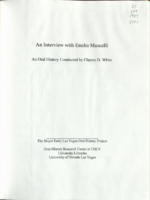
Transcript of interview with Emilio Muscelli by Claytee D. White, November 25, 2008
Date
Archival Collection
Description
Emilio Muscelli was in his mid-80s when he sat for this oral history interview. With a thick Italian accent he recalled his career as a Las Vegas maitre d' that spanned decades of Strip history. Emilio arrived in America in 1948, landed a job at the Copacabana in New York City. His boss was Jack Entratter, who brought Emilio to Las Vegas when he opened the Sands in 1952. Over the decades he has witnessed the ups and downs of Las Vegas economy and has befriended many celebrities along the way. He reminisces during this interview about his friendship with singer Bobby Darin, actor Cary Grant and meeting a laundry list of others. He fondly speaks of those he worked for and their contribution to the growth of Las Vegas.
Text
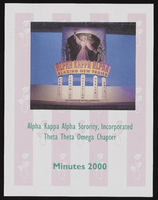
Alpha Kappa Alpha Sorority, Theta Theta Omega Chapter meeting minutes (redacted)
Date
Archival Collection
Description
From the Alpha Kappa Alpha Sorority, Incorporated, Theta Theta Omega Chapter Records (MS-01014) -- Chapter records file.
Text

